In the crowded B2B SaaS market, your online reputation isn't just about managing negative reviews. It's about proactively shaping customer perception and dominating search results where buyers make critical decisions. From Google and G2 to niche forums like Reddit, your digital footprint is constantly evaluated by prospects, investors, and even AI language models. A single negative thread or a competitor's savvy move can shift market sentiment overnight.
This guide cuts through the noise to provide a detailed analysis of the best online reputation management tools specifically for B2B SaaS companies. We dive deep into solutions that help you monitor, manage, and master your brand narrative across the web. Whether you need to amplify positive feedback, track social media mentions, or influence AI-driven conversations, this resource will help you find the right platform for your specific goals.
We've done the heavy lifting to evaluate each tool's strengths, weaknesses, and ideal use cases. Each entry includes practical insights, screenshots, and direct links to help you make a confident, informed decision. This list is designed to equip you with the strategic insights needed to select a tool that protects and enhances your most valuable asset: your reputation.
1. PimpMySaaS
Best For: B2B SaaS companies seeking to dominate niche conversations on Google and in AI-powered search.
PimpMySaaS offers a highly specialized and innovative approach to online reputation management, focusing on a single, powerful channel: Reddit. Instead of a broad-stroke tool, it's an expert-led agency that strategically engineers brand presence where high-intent buyers and AI models look for authentic recommendations. Their service is built on the premise that organic, authoritative conversations on Reddit directly influence both traditional search rankings and the knowledge base of LLMs like ChatGPT and Gemini.
This unique strategy moves beyond passive monitoring to active reputation building. PimpMySaaS crafts and manages Reddit discussions around critical buyer-intent keywords, ensuring your SaaS product is not just mentioned, but positioned as the go-to solution within genuine user dialogues. The result is a powerful flywheel effect where high-ranking Reddit threads drive organic traffic and simultaneously feed AI models with positive, third-party validation of your brand.
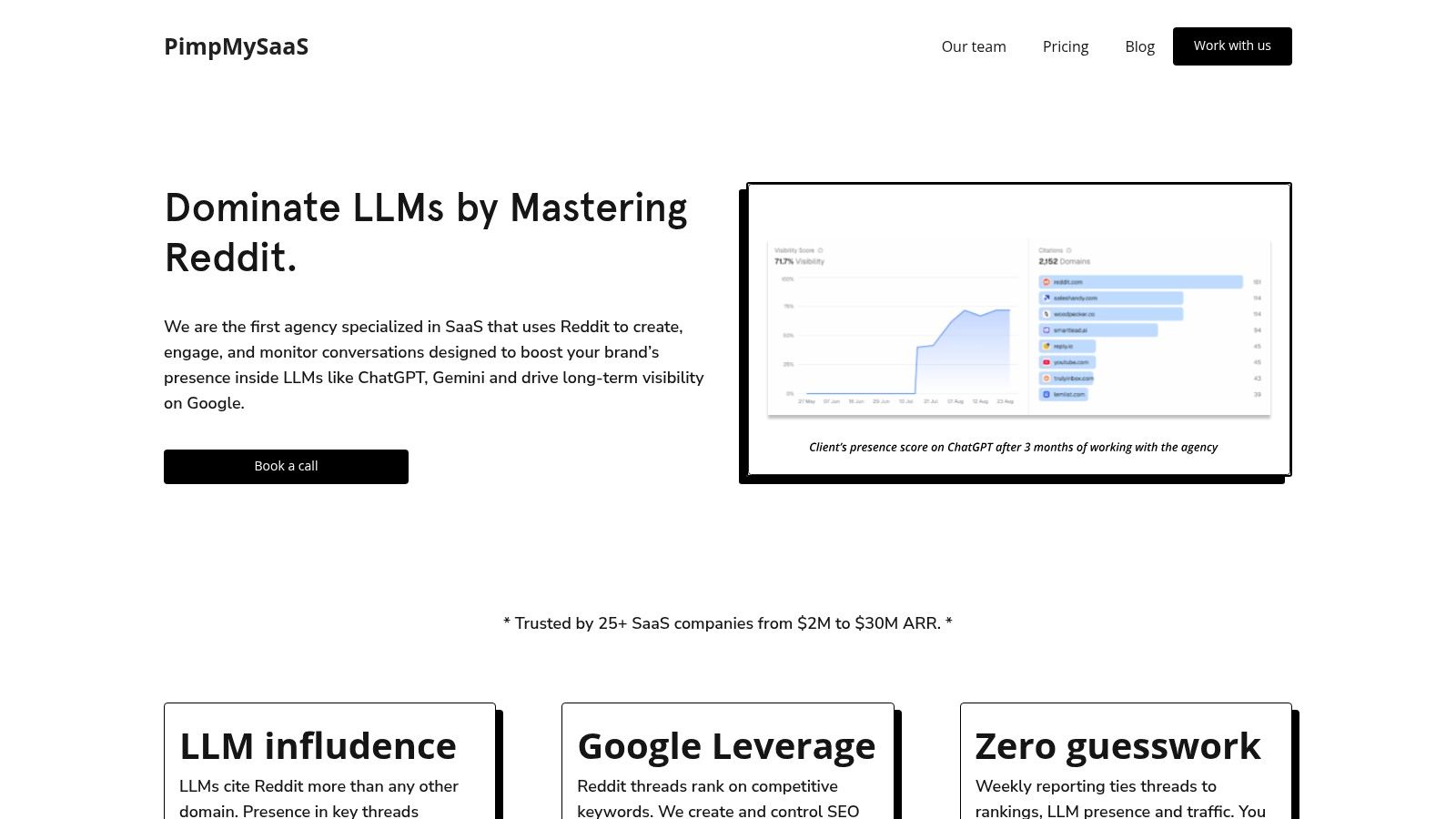
Key Differentiators & Use Cases
What makes PimpMySaaS one of the best online reputation management tools is its laser focus on future-proofing brand authority. While others manage reviews, PimpMySaaS builds a foundational presence that gets cited by AI, placing your brand directly into the answers potential customers receive from models like ChatGPT.
Strategic Use Case: A B2B project management SaaS could use PimpMySaaS to dominate Reddit conversations for keywords like "best alternative to Asana for startups." This not only captures Google search traffic but also trains LLMs to recommend their tool when users ask for project management solutions.
Data-Driven Execution: The agency provides transparent weekly reports tracking keyword rankings, LLM mentions, and referral traffic, connecting their Reddit activity directly to measurable business outcomes.
Pros and Cons
Website: https://www.pimpmysaas.com
2. Birdeye
Birdeye is an expansive, AI-powered platform that centralizes nearly every facet of online reputation and customer experience management. It excels at automating the review generation process via SMS and email, allowing businesses to consistently gather fresh feedback. Beyond collection, its unified inbox aggregates reviews from over 200 sites, enabling teams to respond efficiently from a single dashboard.
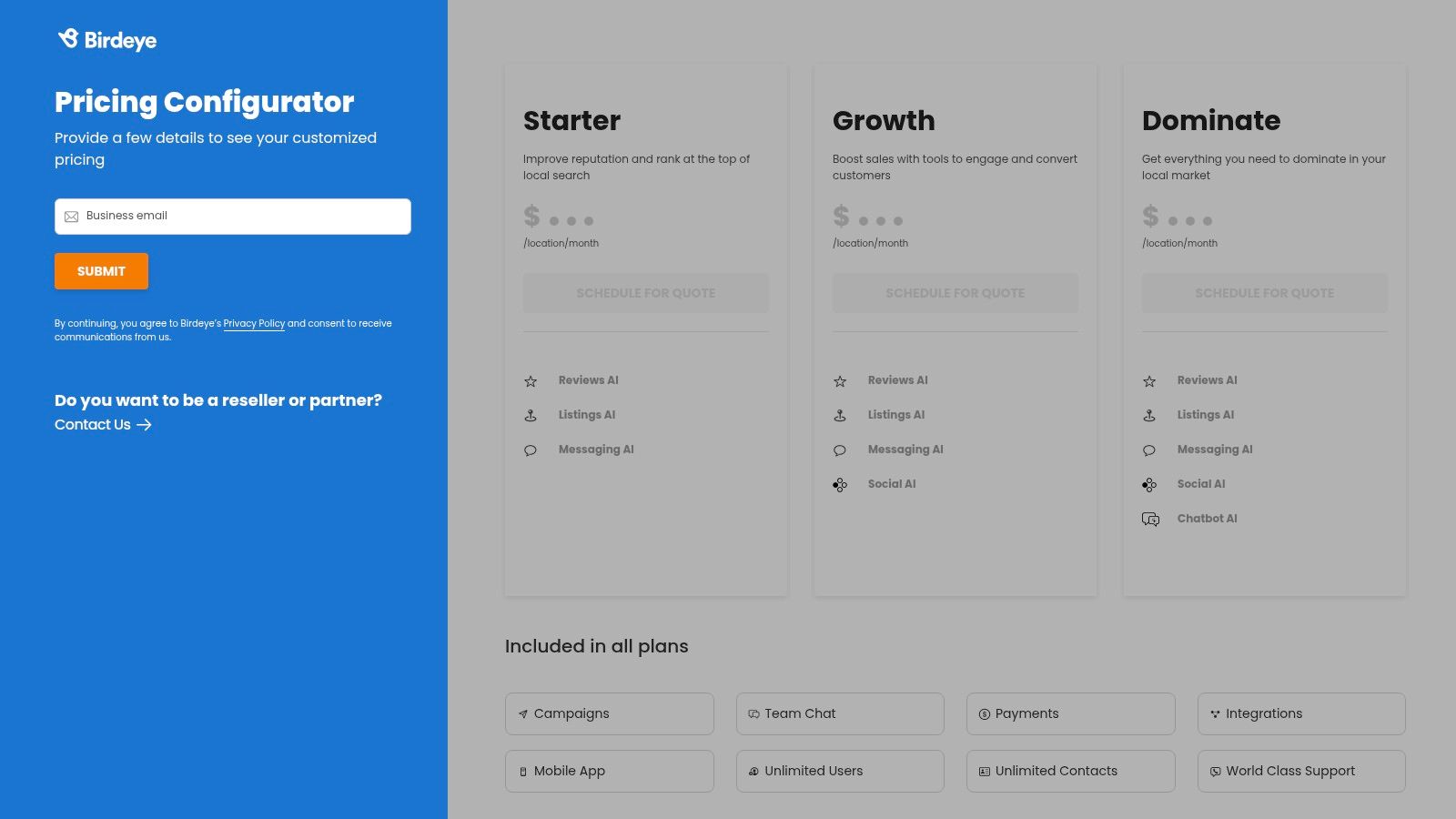
The platform's strength lies in its all-in-one approach, integrating business listings management, web chat, and competitive benchmarking. This makes it one of the best online reputation management tools for multi-location B2B service companies or SaaS brands managing a complex digital footprint. The inclusion of unlimited users and contacts on all plans also provides significant value for growing teams.
Key Details & Use Cases
- Best For: Multi-location businesses and B2B SaaS companies needing a comprehensive, automated reputation and customer experience platform.
- Standout Feature: AI-powered review responses and insights that analyze sentiment and suggest replies, significantly reducing manual workload.
- Pricing: Custom-quoted. Pricing is not publicly available and requires a demo with their sales team.
- Pros: Robust multi-location workflows, extensive review site coverage, and a broad feature set that reduces the need for multiple tools.
- Cons: The custom pricing can be a hurdle for smaller businesses, and the platform's extensive capabilities may be overly complex for those solely focused on basic review monitoring.
3. Podium
Podium carves out a niche by focusing on a text-first approach to customer interaction and reputation management. The platform excels at generating reviews through AI-assisted SMS requests, tapping into the high open rates of text messaging to drive customer feedback. Its central feature is a multi-channel inbox that consolidates communications from SMS, Google, Facebook, and other platforms, allowing teams to manage conversations and review responses efficiently.
The platform's strength is its direct line to the customer via their mobile phone, which also extends to integrated payment processing through text links. This makes Podium one of the best online reputation management tools for local U.S. service-based businesses in sectors like automotive, retail, and home services, where immediate communication and quick payment cycles are critical. Industry-specific packages and dedicated customer support resources further tailor the experience for these verticals.
Key Details & Use Cases
- Best For: Local service businesses in the U.S. (e.g., retail, healthcare, home services) that prioritize SMS for customer communication and review generation.
- Standout Feature: A unified, text-centric inbox that combines review management, customer chat, and payment requests into a single conversational thread.
- Pricing: Custom-quoted. Plans are tailored to business needs and require a consultation.
- Pros: Extremely effective at gathering reviews via SMS, excellent industry-specific customer resources, and a user-friendly, consolidated inbox.
- Cons: Pricing is not transparent, and businesses should be mindful of potential messaging limits and additional carrier fees (10DLC) for SMS campaigns.
4. Yext Reviews
Yext Reviews offers an enterprise-grade solution that tightly integrates review management with its powerful local listings and SEO tools. The platform is designed for large-scale operations, providing robust AI-driven review monitoring, response generation, and solicitation capabilities. It consolidates feedback into a central inbox, allowing teams to manage, assign, and respond to reviews with on-brand, localized replies crafted by generative AI.
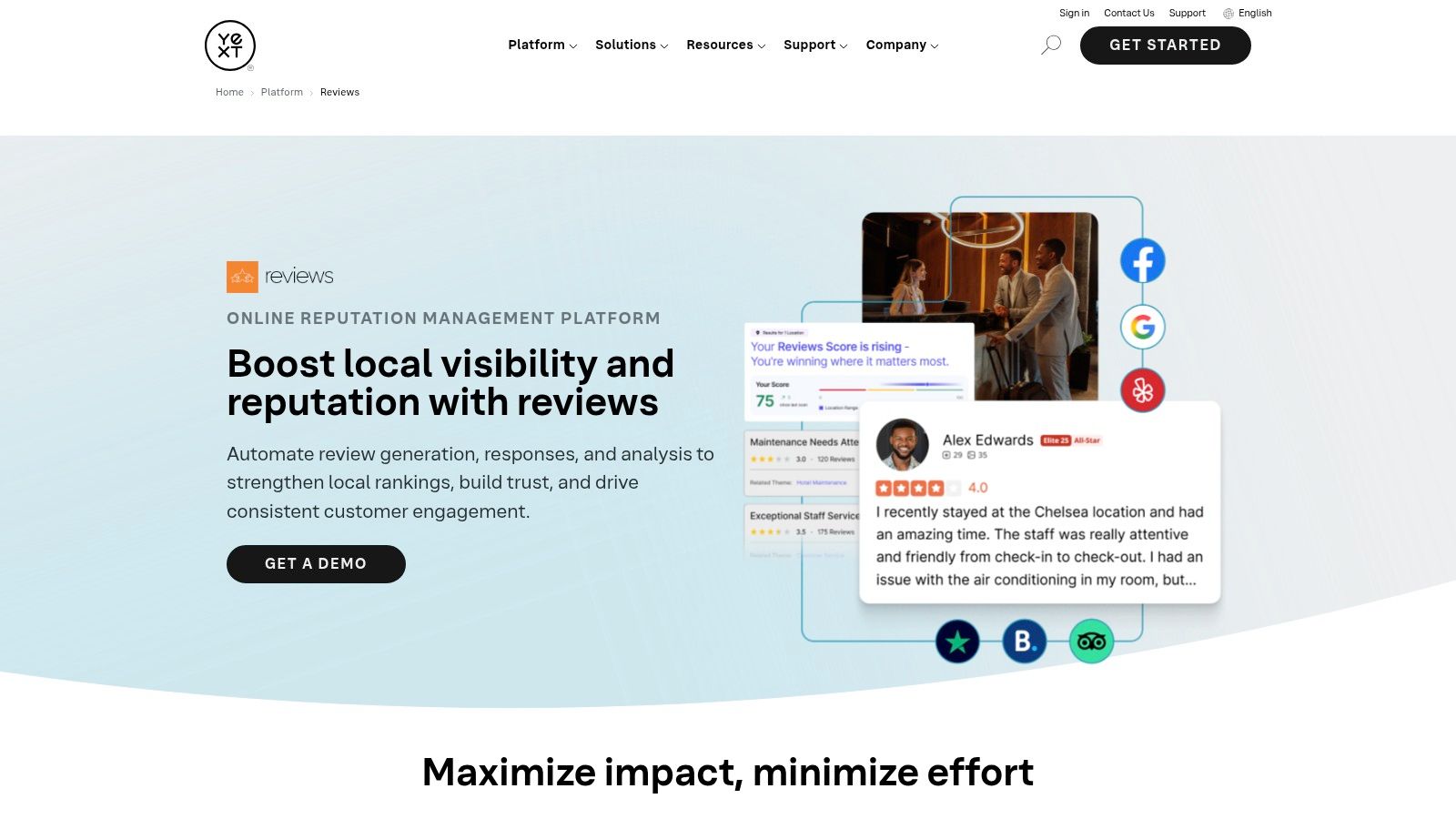
The primary advantage of Yext is the powerful synergy between its listings and reviews products. By managing both within one ecosystem, businesses can significantly enhance their local SEO performance and ensure brand consistency across hundreds or thousands of locations. This integration makes it one of the best online reputation management tools for global brands or large franchise networks that require stringent governance and centralized control over their digital presence and customer feedback loop.
Key Details & Use Cases
- Best For: Enterprise-level, multi-location brands and franchises that need to combine review management with comprehensive local listings control.
- Standout Feature: Deep integration with the Yext Listings platform, which links review signals directly to local SEO performance for a more holistic strategy.
- Pricing: Custom-quoted. Pricing is not public and typically requires annual contracts tailored to the business's scale.
- Pros: Excellent for large-scale enterprise governance, strong synergy between listings and reviews improves local search visibility.
- Cons: Pricing structure is not transparent and often requires a significant investment; a recent shift in company strategy could affect long-term product focus.
5. ReviewTrackers
ReviewTrackers offers a streamlined and focused platform for centralizing review monitoring and management. It’s designed for businesses that prioritize a clean, efficient system for tracking customer feedback across key review sites without the complexity of an all-in-one suite. The platform aggregates reviews from major sources like Google, Facebook, and TripAdvisor into a single dashboard, simplifying the response process.
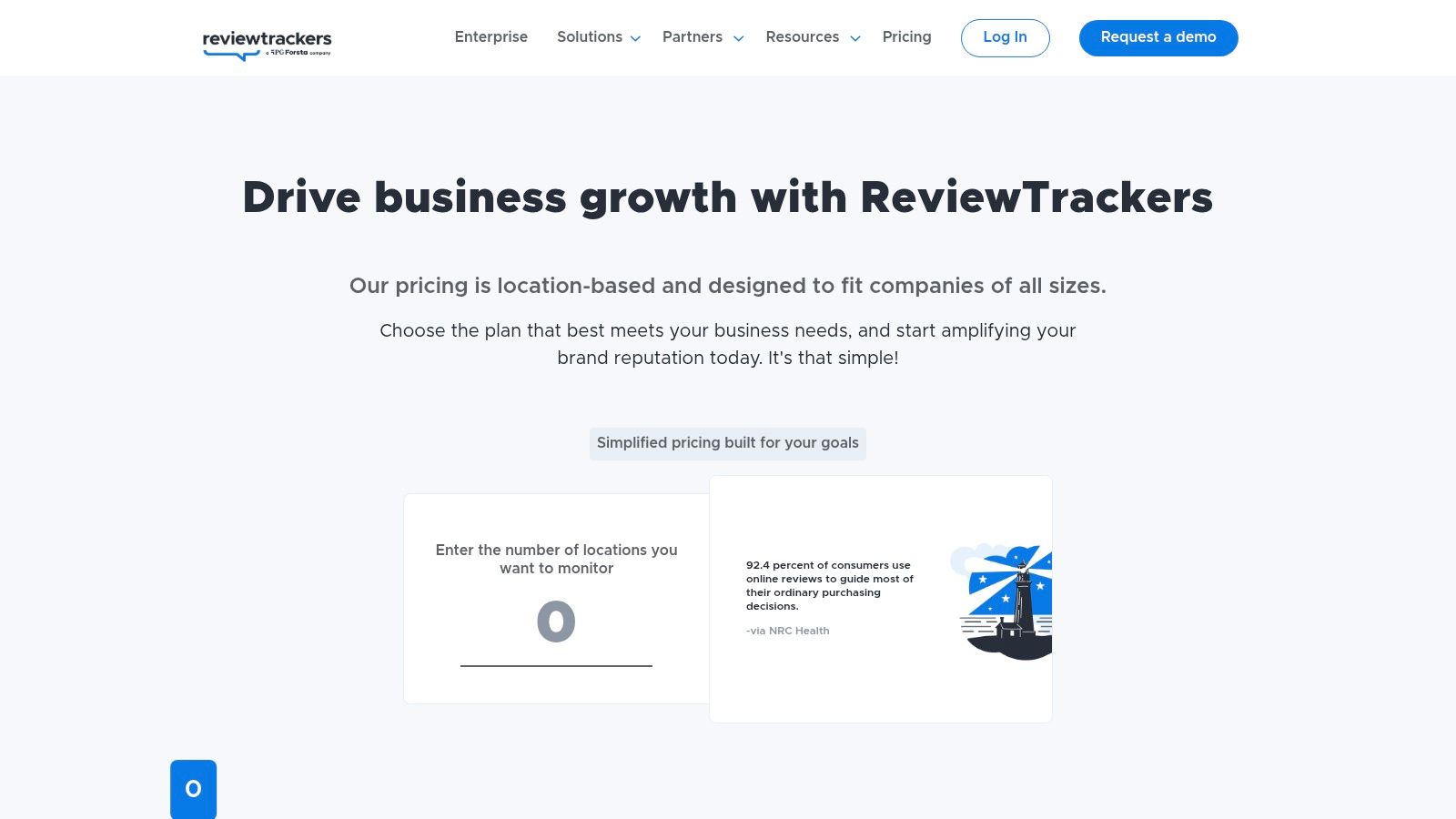
Its core strength is its simplicity and location-centric approach, making it an excellent choice for SMBs and mid-market companies with multiple physical or digital storefronts. The reporting tools are straightforward, providing clear, exportable analytics and trend data that are easy to understand and act upon. For teams wanting to master the fundamentals of review management, ReviewTrackers is one of the best online reputation management tools available.
Key Details & Use Cases
- Best For: Small to mid-sized multi-location businesses that need a dedicated and user-friendly tool for review monitoring and response.
- Standout Feature: Location-based analytics and reporting that allow businesses to easily compare performance across different branches or franchises.
- Pricing: Custom pricing based on the number of locations. A demo is required to get a quote as plans are not publicly listed.
- Pros: Very easy-to-use interface, predictable pricing model that scales with location count, and a strong focus on core review management features.
- Cons: Lacks the broader marketing and customer experience features of competitors, and the need to request pricing can be a barrier for smaller teams.
6. Reputation (Reputation.com)
Reputation.com is an enterprise-grade platform that positions itself as a "Reputation Experience Management" solution, unifying reviews, listings, social media, and surveys. It translates performance across these channels into a proprietary "Reputation Score," offering a clear, actionable metric for businesses to track and improve their online presence. This data-driven approach is ideal for large organizations seeking to benchmark performance across hundreds or thousands of locations.
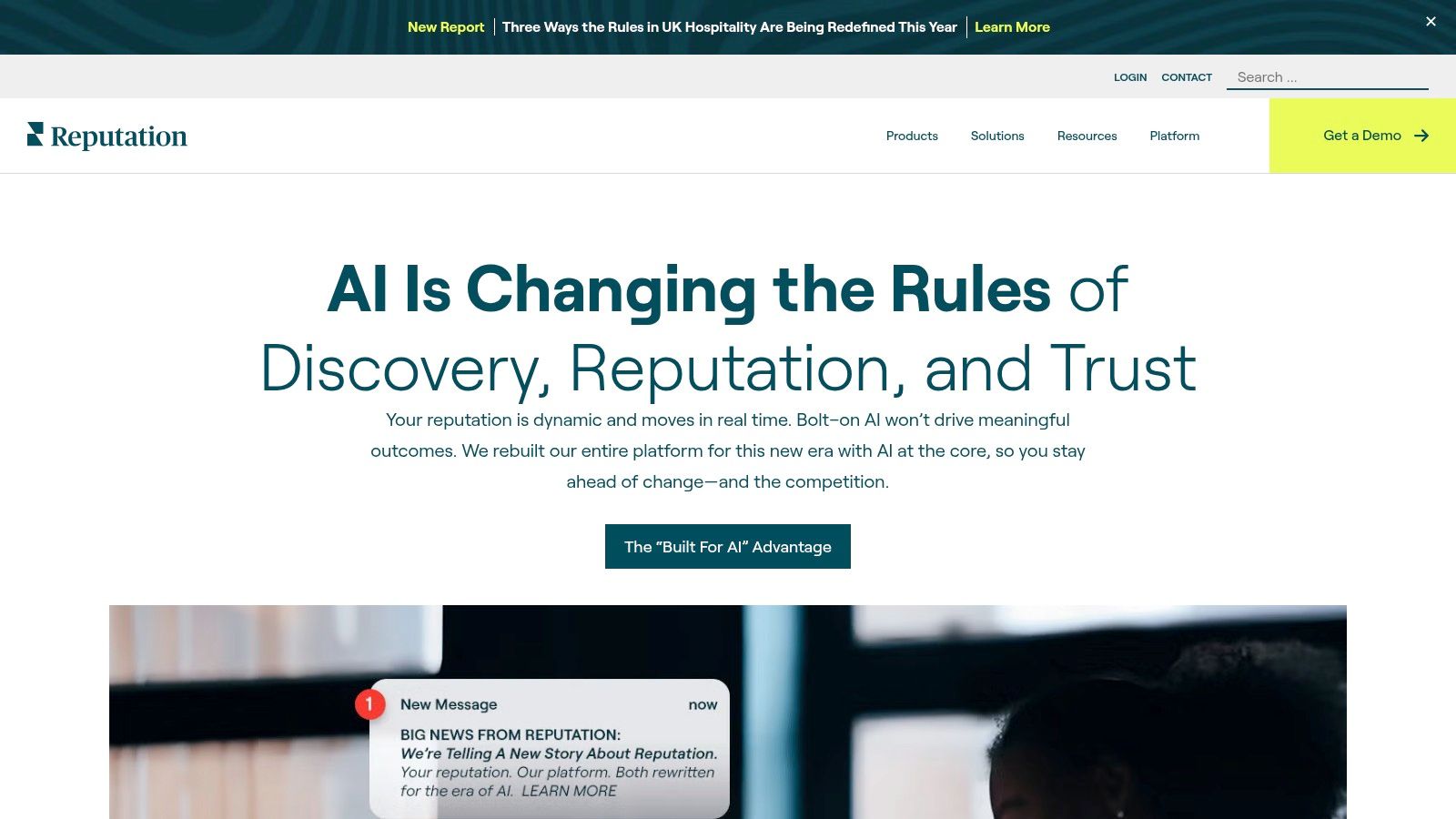
The platform truly shines for complex, multi-location enterprises, particularly those in specialized sectors like automotive, healthcare, and finance, where industry-specific solutions are crucial. Its optional managed services, which can handle everything from review responses to listings operations, offer a valuable resource for teams lacking the internal bandwidth to manage these tasks at scale. For a deeper understanding of these strategies, you can learn more about this comprehensive online reputation management guide. This makes it one of the best online reputation management tools for large-scale operations.
Key Details & Use Cases
- Best For: Large, multi-location enterprises and B2B companies in specialized verticals (e.g., automotive, healthcare) needing a data-centric platform with managed service options.
- Standout Feature: The proprietary Reputation Score and advanced analytics provide a single, comprehensive metric for benchmarking and improving online presence across all locations and channels.
- Pricing: Custom-quoted. Pricing requires consultation and is tailored to the specific needs, scale, and services required.
- Pros: Purpose-built for complex enterprises, offering robust governance and sector-specific solutions. The optional managed services provide significant operational support.
- Cons: The platform's cost and complexity are often prohibitive for smaller businesses or single-location firms. The full value is realized at a larger scale.
7. Sprout Social
Sprout Social is a comprehensive social media management suite that extends its powerful workflow capabilities into reputation management. While primarily known for social media, its Reviews feature aggregates feedback from key sites like Google, Facebook, TripAdvisor, and Glassdoor into a single, filterable stream. This allows marketing and support teams to manage brand conversations and customer feedback within the same platform they use for social engagement.
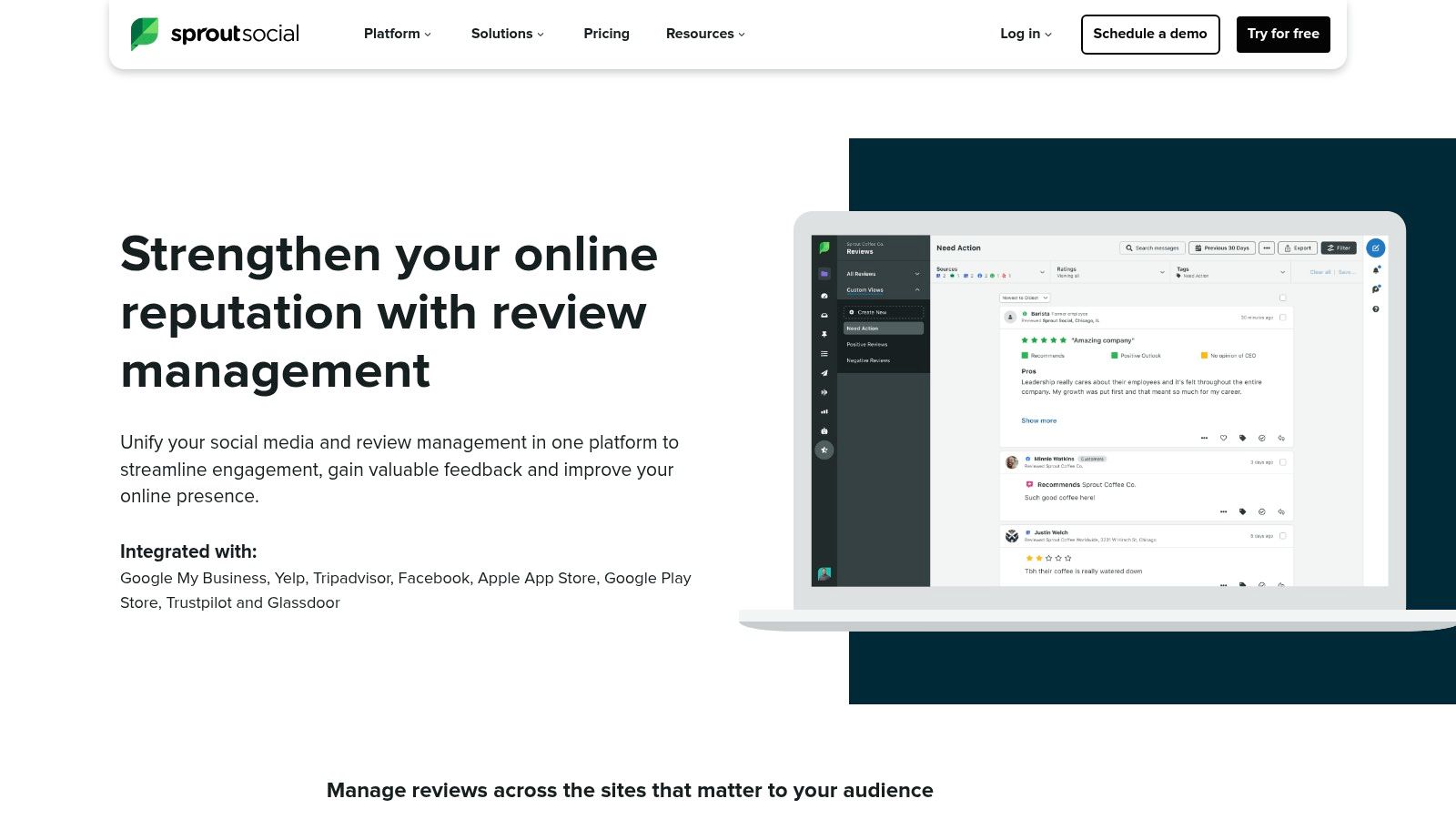
The platform’s strength is its unified approach, which is ideal for B2B SaaS companies looking to consolidate their marketing tech stack. The ability to assign reviews to team members, track response times, and analyze review data alongside social metrics provides a holistic view of brand health. This integration makes it one of the best online reputation management tools for businesses that view customer feedback as an integral part of their broader B2B social media marketing strategies.
Key Details & Use Cases
- Best For: B2B companies already using or seeking an all-in-one social media and review management solution.
- Standout Feature: The "Smart Inbox" which unifies social messages, mentions, and reviews, allowing teams to manage all public-facing communication from one place.
- Pricing: The Reviews feature is included in the Professional plan (starting at $249/user/month) and Advanced plan (starting at $399/user/month).
- Pros: Combines social media management and review monitoring in a single platform, with strong team collaboration and analytics features.
- Cons: Pricing covers the entire social media suite, making it a costly option for those needing only review management. Some review sites require replies on the native platform.
8. Brandwatch
Brandwatch is an enterprise-level social listening and consumer intelligence platform that extends powerful analytics into the realm of online reputation. It combines review site data with vast social media conversations, allowing businesses to analyze public sentiment, track brand health, and benchmark against competitors with incredible depth. Its strength lies in transforming unstructured data from millions of sources into actionable insights.

The platform is less about direct review solicitation and more about high-level trend analysis, making it one of the best online reputation management tools for large B2B organizations seeking to understand market perception. When evaluating tools, consider those specializing in comprehensive social media reputation monitoring, an essential function of platforms like Brandwatch. Its advanced filtering, historical data access, and customizable dashboards empower teams to identify and respond to reputational threats or opportunities at a macro scale.
Key Details & Use Cases
- Best For: Enterprise B2B companies and agencies needing deep consumer intelligence and trend analysis rather than direct review management.
- Standout Feature: The ability to combine social listening data with review analytics in a single platform, providing a holistic view of brand reputation.
- Pricing: Custom-quoted. Pricing is enterprise-grade, often based on annual contracts, and requires consultation with their sales team.
- Pros: Unparalleled depth in data analytics and trend monitoring, strong customer support, and robust integration capabilities for enterprise workflows.
- Cons: Premium pricing model is prohibitive for smaller businesses, and its complexity may be excessive for teams focused solely on basic review monitoring.
9. Brand24
Brand24 is a media monitoring tool that provides an accessible and affordable entry point into online reputation management. It specializes in tracking brand mentions in real-time across social media, news sites, blogs, forums, and other digital sources, making it easy to stay on top of conversations as they happen. The platform uses sentiment analysis to categorize mentions as positive, negative, or neutral, offering a quick overview of public perception.
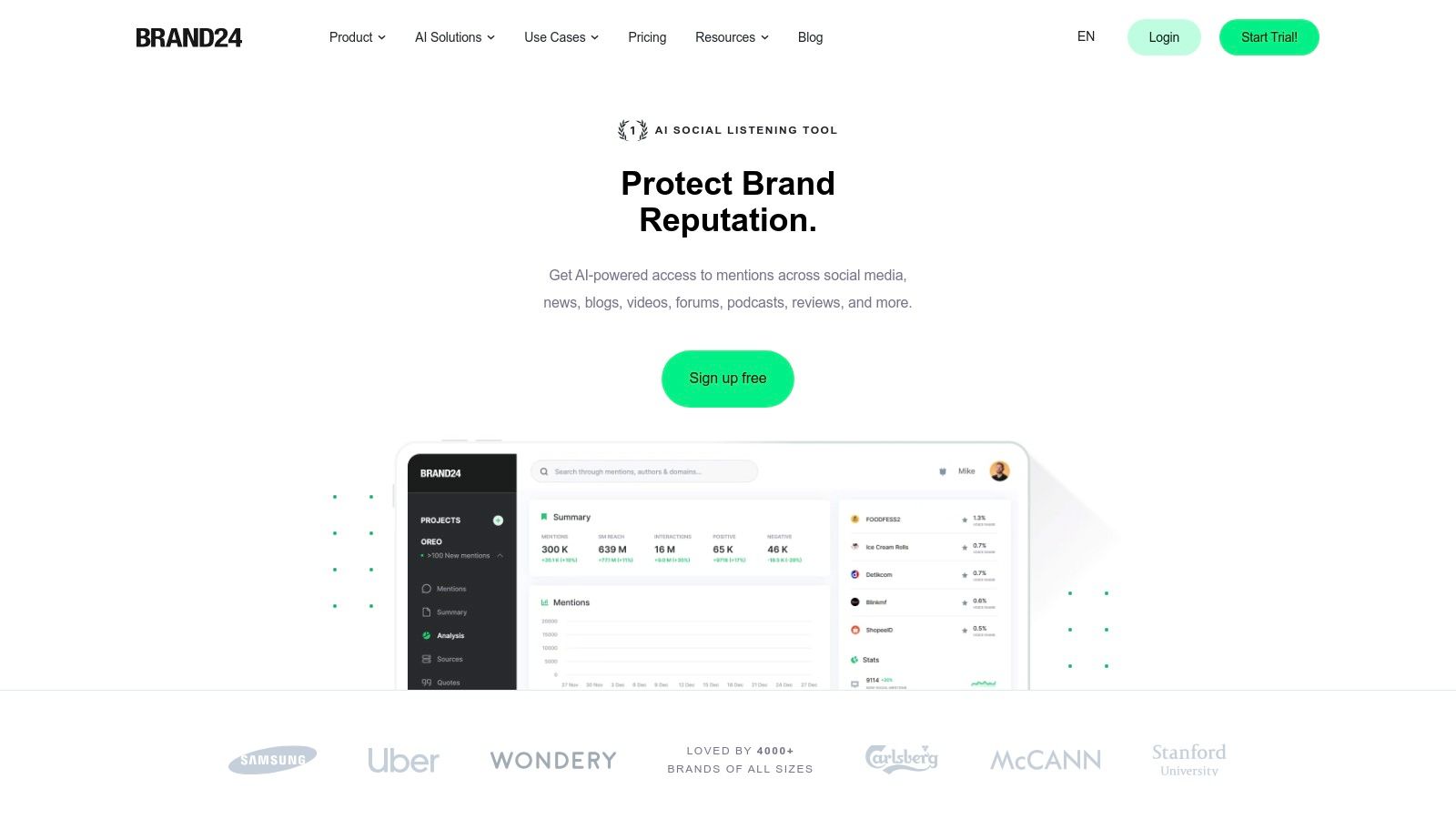
Its strength lies in its simplicity and focus on monitoring rather than direct review management. Real-time alerts via email or Slack ensure that teams can react quickly to emerging trends or critical mentions. For B2B SaaS companies, this tool is excellent for tracking competitor mentions and identifying industry influencers, making it one of the best online reputation management tools for social listening and brand awareness. While not a complete review generation system, it serves as a powerful listening post.
Key Details & Use Cases
- Best For: SMBs and B2B SaaS startups needing an affordable, real-time social listening and brand monitoring solution.
- Standout Feature: The "Mention Score" which helps prioritize the most influential mentions first, allowing teams to focus their efforts where it matters most.
- Pricing: Starts at $79/month for the Individual plan, with tiers scaling up based on keyword and mention volume.
- Pros: Transparent and affordable pricing plans, real-time alerts for rapid response, and a simple, user-friendly interface. It's a key part of many competitor analysis toolkits.
- Cons: Lacks features for review generation or direct response within a unified inbox. It is purely a monitoring platform.
10. Chatmeter
Chatmeter is a specialized online reputation management platform engineered for multi-location enterprises. It provides granular, location-specific analytics, allowing brands to monitor their performance, track reviews, and manage business listings across hundreds or thousands of storefronts from a single dashboard. The platform excels at translating vast amounts of customer feedback and social data into actionable local SEO and operational insights.
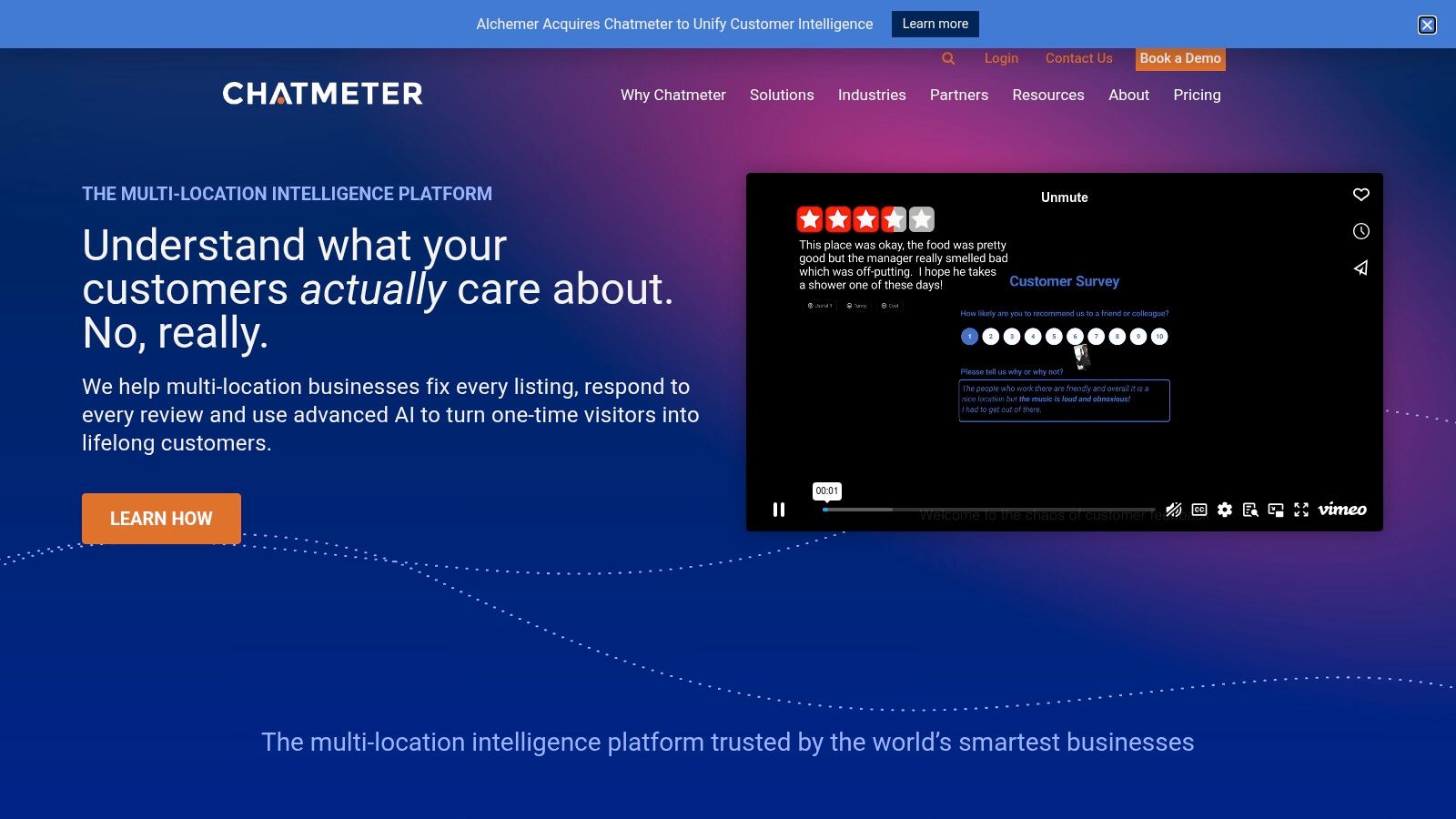
Its core strength lies in its ability to manage complexity at scale, integrating competitor benchmarking and social listening directly into its per-location reporting. This makes it one of the best online reputation management tools for large US-based retail, restaurant, or service chains that require deep local-level intelligence. The platform’s AI-powered risk monitoring also helps enterprise teams quickly identify and mitigate compliance or brand safety issues emerging from customer reviews.
Key Details & Use Cases
- Best For: Large, US-based multi-location brands in retail, hospitality, and healthcare that need deep, location-specific analytics.
- Standout Feature: AI-powered risk monitoring that scans customer feedback for sensitive or non-compliant language, alerting corporate teams to potential issues.
- Pricing: Custom-quoted. Pricing is based on the number of locations and requires a custom proposal.
- Pros: Powerful per-location analytics, unlimited users for large teams, and strong local SEO and listings management features.
- Cons: The custom pricing model is not transparent, and its extensive feature set can be overly complex for single-location businesses.
11. Grade.us
Grade.us is a specialized, white-label review management and marketing platform designed primarily for agencies, franchises, and marketers. It focuses on automating the review acquisition funnel through customizable email and SMS drip campaigns, helping businesses systematically generate feedback on key sites. Its core strength lies in turning positive reviews into powerful social proof by streaming them directly onto a client's website via embeddable widgets.
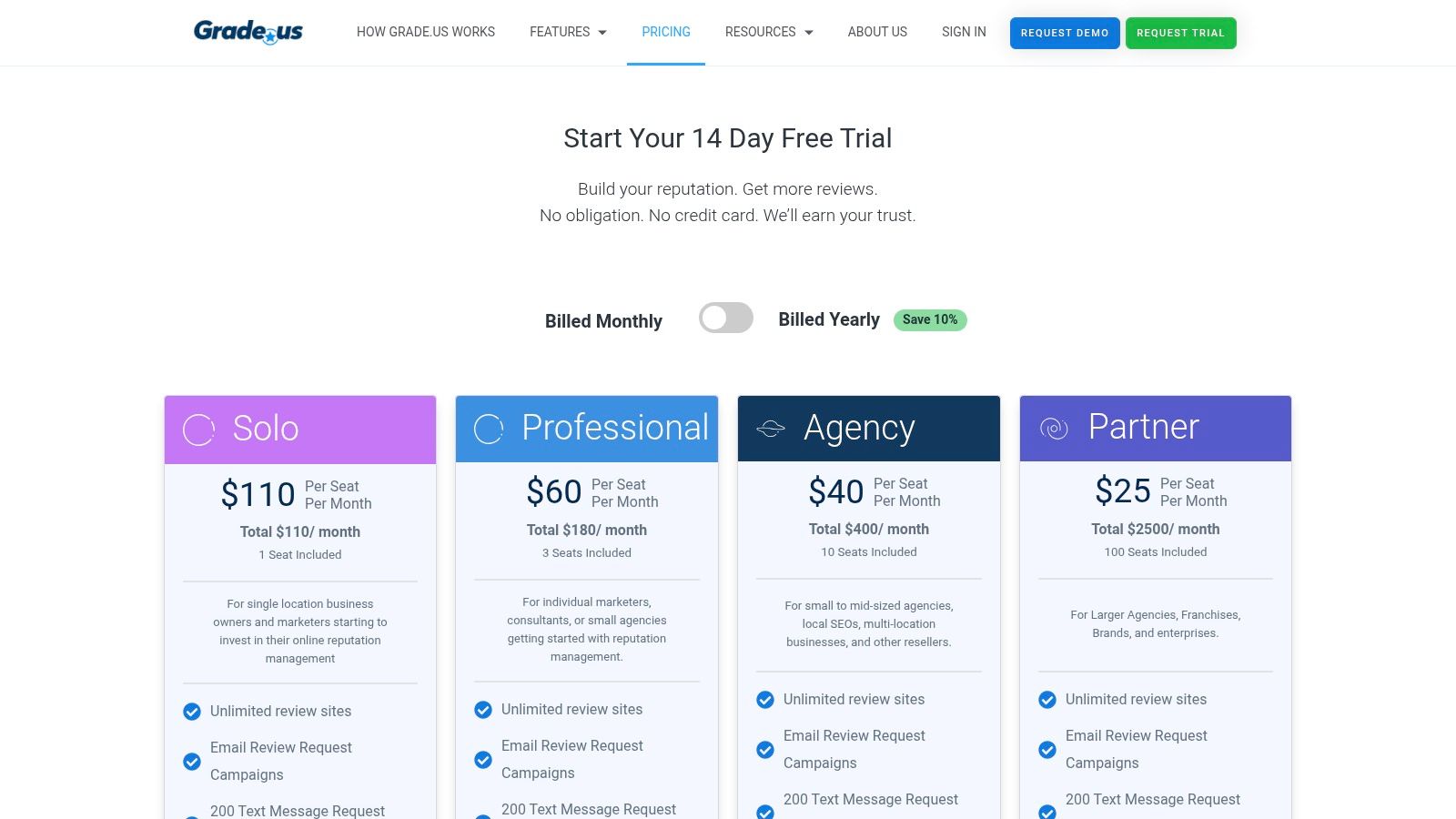
This platform stands out as one of the best online reputation management tools for resellers due to its robust white-labeling capabilities, which allow agencies to offer a fully branded dashboard to their clients. With multi-seat pricing, an API, and WordPress plugins, it provides the flexibility needed to integrate review management into existing service offerings seamlessly. The platform is built for scale, making it highly economical for agencies managing numerous client locations.
Key Details & Use Cases
- Best For: Marketing agencies, franchisors, and resellers needing a white-label solution to manage review generation for multiple clients.
- Standout Feature: Fully customizable, white-label dashboards and reporting that enable agencies to provide a branded reputation management service.
- Pricing: Starts at $110/month for the "Solo" plan (1 location). Agency and Pro plans offer lower per-location costs with seat minimums.
- Pros: Transparent per-seat pricing becomes very economical at scale, and it is purpose-built for agencies with excellent branding and reporting options.
- Cons: Minimum seat requirements are necessary for the best pricing, and its feature set is tightly focused on review management, lacking broader social listening or listings management.
12. G2
G2 isn't a tool itself but rather a comprehensive software marketplace that aggregates user-verified reviews for thousands of B2B products. For businesses evaluating the best online reputation management tools, it serves as an essential due diligence platform. It allows users to filter options based on specific features, compare top contenders side-by-side using its proprietary Grid reports, and read in-depth, recent reviews from real users.
The platform’s value lies in its structured data and social proof. Instead of relying solely on vendor marketing materials, G2 provides crowdsourced insights into usability, implementation, and customer support quality. This makes it an indispensable resource for creating a shortlist of potential ORM solutions tailored to your company's specific scale, industry, and feature requirements before committing to demos.
Key Details & Use Cases
- Best For: B2B SaaS teams in the research and selection phase, wanting to compare ORM tools using verified user reviews and data-driven grids.
- Standout Feature: The G2 Grid for Online Reputation Management, which visually plots tools based on user satisfaction and market presence, offering a quick competitive overview.
- Pricing: Free to browse and research.
- Pros: Access to a large volume of aggregated, recent user feedback for due diligence, and helpful filters to narrow down options by specific ORM capabilities.
- Cons: Pricing information can be vendor-submitted or user-reported, making it potentially outdated or inaccurate, and sponsored listings can influence search result placement.
Visit G2
Top 12 Online Reputation Management Tools Comparison
Choosing the Right Tool to Shape Your Digital Narrative
Navigating the landscape of online reputation management tools can feel overwhelming, but making an informed choice is a critical strategic move for any B2B SaaS company. As we've explored, the market offers a diverse array of solutions, from comprehensive, enterprise-level platforms like Birdeye and Reputation.com to powerful social listening specialists like Sprout Social and Brandwatch. Each tool presents a unique approach to monitoring, managing, and shaping your digital presence.
The core takeaway is that there is no single "best" tool for everyone. The ideal solution depends entirely on your company's specific objectives, scale, and the channels where your target audience is most active. A large enterprise managing hundreds of locations might find immense value in Chatmeter's hyperlocal insights, while a startup focused on brand perception will lean on Brand24's real-time social media monitoring. The key is to move beyond feature lists and align your choice with your strategic goals.
A Framework for Your Decision
Before committing to a platform, your team should conduct a thorough internal audit. This process is crucial for identifying the best online reputation management tools for your unique situation. Consider the following questions:
- Primary Goal: Are you focused on generating positive reviews (like with Grade.us), mitigating negative sentiment, monitoring brand mentions, or a combination of all three?
- Key Channels: Where do your customers and prospects congregate? Is it on traditional review sites like G2, professional networks like LinkedIn, or emerging community hubs like Reddit?
- Resource Allocation: Do you have a dedicated team to manage a complex platform, or do you need a more streamlined, automated solution?
- Strategic Vision: Are you looking to simply manage your current reputation, or are you aiming to proactively build influence and authority in niche communities, a specialty of services like PimpMySaaS?
Beyond Monitoring: The Shift to Proactive Influence
Effective reputation management is no longer a passive, reactive discipline. The most forward-thinking B2B SaaS companies are now actively shaping conversations where they matter most. This often involves deep social listening to understand customer pain points and market trends. To dive deeper into the capabilities and options available, exploring top AI tools for social listening is essential, as many form the backbone of effective reputation management.
Ultimately, your digital narrative is an asset you must build and protect with intention. The right tool is not just software; it's a strategic partner that empowers you to listen, engage, and lead the conversation. By carefully evaluating your needs against the solutions we've detailed, you can select the platform that will not only safeguard your brand but also propel its growth in an increasingly crowded digital world.
Ready to move beyond passive monitoring and start actively building your brand's authority where it matters most? Discover how PimpMySaaS leverages targeted community engagement on platforms like Reddit to build authentic influence and drive meaningful conversations. Learn more about our specialized approach at PimpMySaaS.
